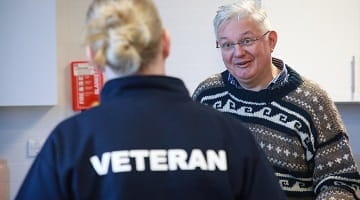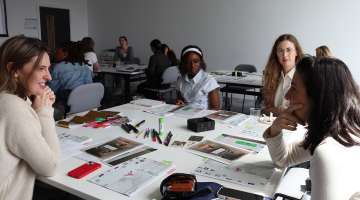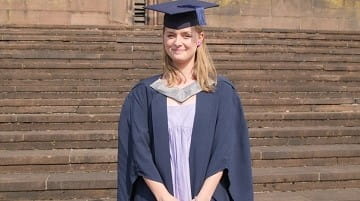About this course
LJMU's innovative MA International Relations provides a grounding in key theories while examining in depth issues of enduring international significance
The world in the 21st century continues to be defined by long-standing and emerging global challenges. While state-based and civil conflicts are resurging after decades of relative decline, new non-traditional threats are emerging in the form of health pandemics, climate change, terrorism, and the potential disruptive impact of artificial intelligence.
This MA in International Relations equips students with theoretical frameworks and methodological tools needed to understand, analyse, and address these evolving challenges that define our world. Across a range of core and optional modules, students will be introduced to key theoretical perspectives within International Relations discipline, alongside the associated fields of conflict and security studies, and will be given the opportunity to apply these across a range of thematic areas and regional case studies. Students will also undertake an independent research project on a topic of their choice, enabling them to build essential research and analytical skills.
In addition to classroom learning, students have the opportunity to engage in applied learning experiences. Each year, the programme includes a trip to Derry/Londonderry in Northern Ireland, where students gain first-hand insights from practitioners and community groups on the legacy of conflict in the city and ongoing efforts towards peace and reconciliation. Students can also attend the Department of International Relations and Politics’ speaker series, which features established scholars discussing current issues in the field.
Teaching is delivered by research-active experts in the field and across a range of disciplines. Graduates leave with essential skills for careers in conflict resolution, global security, and international relations, and many have gone on to work with prominent organisations such as the Foreign, Commonwealth and Development Office, National Crime Agency and the Home Office.
Course modules
Discover the building blocks of your programme
Further guidance on modules
Modules are designated core or optional in accordance with professional body requirements, as applicable, and LJMU’s Academic Framework Regulations. Whilst you are required to study core modules, optional modules provide you with an element of choice. Their availability may vary and will be subject to meeting minimum student numbers.
Where changes to modules are necessary these will be communicated as appropriate.
Core modules
Research Project in International Relations
60 credits
60 credits
This module will prepare you to undertake your dissertation following the relevant research methods module. It will enable you to:
- engage in independent and critical thinking and apply theoretical concepts in the field of international relations
- apply knowledge of recent advances within the field of international relations and situate the proposed work accordingly
- identify, access and critically evaluate relevant research resources
- present and defend research findings in an appropriate and scholarly manner
- examine an appropriate area of research and modify the project after discussion, reflection and feedback
Advanced International Theories: Concepts and Perspectives’
30 credits
30 credits
This core module provides an introduction to International Relations by examining the theories, key concepts and authors. It aims to:
- engage you in independent and critical thinking
- develop and engage with the theoretical concepts and apply them to the world
- develop the ability to present and defend arguments and interpretations in an appropriate and scholarly manner
- help you understand global events from the state, non-state and international perspectives
Research Methods for International Relations
10 credits
10 credits
This module provides a thorough understanding of the key skills required to develop and carry-out a research-based project or dissertation on the subject of International Relations. It aims to:
- introduce you to postgraduate-level methodological and theoretical approaches to researching international relations
- provide the opportunity to critically appraise methodological and theoretical approaches to researching international relations
- provide the skills required to undertake a research project at postgraduate level
Critical Security Studies
20 credits
20 credits
Through an exploration of key contemporary issues including gender, race, health security, nuclearization, migration and terrorism, this module will provide a set of key concepts and resources to help students develop an in-depth understanding of the modern security environment through the lens of Critical Security Studies. As such, this module will provide students with the necessary theoretical tools to understand how ‘security’ opens up wider questions of power, inequality, war, and peace internationally. In particular, this module will be important for students who are keen on pursuing a career within policy-making, research and industries concerned with security, development and peace-building.
Optional modules
The War/Peace Cycle
20 credits
20 credits
This module develops a comprehension of the theory, practice and historical development of the War/Peace Cycle. It will demonstrate an understanding of the strategic significance of the War/Peace cycle in international relations over the course of the last 200 years. It also builds in-depth knowledge of particular problems in the War/Peace cycle.
War and Peace in Africa since 1990
20 credits
20 credits
This module engages with both political science and historical approaches to the study of warfare in contemporary Africa. It will enable you to:
- consider the nature of international interventions in African wars
- consider the dilemmas of post-conflict agendas of justice and reconciliation
Conflict and Warfare in International Law
20 credits
20 credits
This module aims to:
- consider current controversies in international law pertaining to the use of force between states
- provide you with an understanding of legal limitations on methods and means of armed conflict
- explore modern and emerging challenges to the law of armed conflict
The United Nations, International Security and Global Justice
20 credits
20 credits
The module aims to:
- introduce you to the work of the United Nations in the maintenance and restoration of international peace and security
- develop your understanding of the legal framework which governs the work of the UN in this area
International Human Rights Law
20 credits
20 credits
Introduces students to the basic conceptual, institutional and substantive elements of international human rights law, current debates regarding the interpretation and application of international human rights law.
The module will provide students with critical appreciation of contemporary issues of global and regional concern relating to the interpretation and application of international human rights law.
Your Learning Experience
An insight into teaching on your course
Study hours
Full-time students spend around seven hours a week in on-campus sessions and part-time students three to four hours. The Practitioner Workshops and the Perspectives in IR series take place four times each semester and add an extra 30 minutes a week to the on-campus study time.
Teaching methods
Teaching will be delivered as a combination of class discussions, lectures and workshops with core academic staff and invited practitioners, experts and guest lecturers. The aim is to give you as much insight into the world of International Relations as possible and this is best achieved through a mix of academic discussion and real world experiences.
How learning is monitored on your programme
To cater for the wide-ranging content of our courses and the varied learning preferences of our students, we offer a range of assessment methods on each programme.
The aim in all the assessments is to test your understanding of International Relations. Assessments on this course are a mixture of essays, presentations, exams and portfolios.
Where you will study
Based within the John Foster Building on the Mount Pleasant Campus the School of Humanities and Social Science has many outstanding facilities, including well-equipped IT Suites, a light-filled Student Common Room and dedicated postgraduate study areas. At the back of the John Foster Building is the Aldham Robarts Library, which gives access to an exceptional range of materials to support the study of humanities and social science.
Course tutors

Dr Peter O'Reilly
Programme Leader
I have taught widely across the School on modules related but not limited to: security, the sociology and politics of sports, international organizations, IR theory, sociological theory and identity, qualitative methods and international fieldwork, and global issues.
I have taught widely across the School on modules related but not limited to: security, the sociology and politics of sports, international organizations, IR theory, sociological theory and identity, qualitative methods and international fieldwork, and global issues.
Peter O’Reilly in a Lecturer in International Relations and Politics and currently Programme Leader for the MA in International Relations. He completed his PhD at the University of York in 2019 on integrative and disintegrative dynamics in the East African Community (EAC) and his research continues to examine themes around regionalism and the politics of trade across Africa. He has taught widely on topics including Africa and World Politics, Global Development and Conflict and Peace in Africa.
-
 Reader
Reader -

-
 Lecturer/Senior Lecturer
Lecturer/Senior Lecturer
Career paths
Further your career prospects
LJMU has an excellent employability record with 96% (HESA 2018) of our postgraduates in work or further study six months after graduation. Our applied learning techniques and strong industry connections ensure our students are fully prepared for the workplace on graduation and understand how to apply their knowledge in a real world context.
Typically students who study the MA will be progressing from their first degree in history, politics or a related-subject.
This programme has been designed to enhance your career prospects in international relations-related fields including government and non-government sectors. It exposes you to the careers available and enables you to network with people in the field.
For students wishing to pursue an academic career or for further study in the field of international relations, this MA will provide a solid basis when applying for a MPhil/PhD.
Tuition fees and funding
- Full-time per year:
- £8,390
Fees
The fees quoted above cover registration, tuition, supervision, assessment and examinations as well as library membership and student IT support with access to printed, multimedia and digital resources including programme-appropriate software and on campus wifi.
Financial Support
There are many ways to fund postgraduate study for home and international students. From loans to International Scholarships and subject-specific funding, you’ll find all of the information you need on our specialist postgraduate funding pages. The University offers a range of financial support for students. You'll find all the information you need on our specialist financial support pages including details of the Student Support Fund and other activities to support with the cost of living.
Additional Costs
In addition to fees, students should also keep in mind the cost of:
- Accommodation
- Travel costs and field trips unless paid for by LJMU
- Stationery, IT equipment, professional body membership and graduation gown hire
Entry requirements
You will need:
Qualification requirements
Undergraduate degree
- a minimum 2:1 honours degree in a related subject such as Law, History, Politics, Sociology, Geography, Anthropology or Economics
Alternative qualifications considered
- applications from candidates with non-related degrees will be considered on a case-by-case basis.
Additional requirements
-
Relevant work experience
- we welcome applications from non-standard applicants who can demonstrate relevant work experience of at least 2 years in an international relations related field and an ability to succeed at MA level.
Further information
-
Extra Requirements
- to demonstrate the ability to benefit from and contribute to the programme
-
RPL
- RPL is accepted on this programme
How to apply
Securing your place at LJMU
To apply for this programme, you are required to complete an LJMU online application form. You will need to provide details of previous qualifications and a personal statement outlining why you wish to study this programme.
A pre-written personal statement (minimum 500 words) can be copied and pasted into your application in the appropriate section of the online form. Your personal statement should include information on why you are interested in the subject of International Relations, why you are interested in the International Relations programme at Liverpool John Moores University, and how your previous knowledge and experiences would contribute to you being successful on the programme.
Your university life
From accommodation and academic support to clubs and societies. Find out what LJMU has to offer.
Related Links
Talk to our students
Connect with a current LJMU student for advice and guidance on university life, courses and more.
See what our students are saying
At LJMU we want you to know you’re making the right choice by studying with us. You can see what our students are saying about their experience with us through their reviews on the following websites:
Related Links
News and views
Browse through the latest news and stories from the university



.png)






The University reserves the right to withdraw or make alterations to a course and facilities if necessary; this may be because such changes are deemed to be beneficial to students, are minor in nature and unlikely to impact negatively upon students or become necessary due to circumstances beyond the control of the University. Where this does happen, the University operates a policy of consultation, advice and support to all enrolled students affected by the proposed change to their course or module.


















